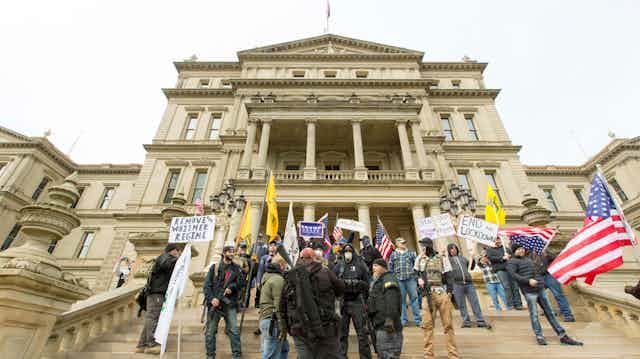Nothing will be the same again, and maybe that’s a good thing. The potentially devastating impact of COVID—19 on the world economy is beyond the scope of measure. UN Secretary-General Antonio Guterres has expressed concern that the pandemic could trigger conflicts around the world. The heart-warming pictures of Italians singing from their balconies at the start of the crisis is gradually being replaced by mounting incidents of social unrest, with increasingly longer queues at food banks. The risk is that if the economy collapses it will also bring down civil society with it. Political philosophers have a term for it: we are being propelled towards the “state of nature”.
Thomas Hobbes introduced the concept of the state of nature in his 1651 book The Leviathan. He was very clear that the state of nature was not an archaic state of affairs that occurred in the remoteness of time but something that can occur at any moment. Whenever political stability breaks down, it can be replaced by anarchy. And of course, for Hobbes, the state of nature was not a pretty place:
In such condition, there is no place for Industry; because the fruit thereof is uncertain; and consequently no Culture of the Earth; no Navigation, nor use of the commodities that may be imported by Sea; no commodious Building; no Instruments of moving.
We are not in a Hobbesian state of nature – not yet. We don’t anticipate having, in the words of Hobbes, “no account of Time; no Arts; no Letters; no Society”, although at present there is no theatre, no concerts, no travel and no sporting events. We are also starting to see initial manifestations of what Hobbes called the “war of all against all”: such as countries aggressively outbidding each other on the global market for coronavirus protective equipment and anti-lockdown protests in the US including heavily-armed rallies enjoying the blessing of President Donald Trump
Hobbes goes on to capture the essence of the state of nature in chilling and memorable terms: “And which is worst of all, continual fear, and danger of violent death; And the life of man, solitary, poor, nasty, brutish, and short”. COVID-19 has instilled fear in all of us – continual fear.
All is not lost
Fortunately, Hobbes also teaches us that we are not doomed, that it is possible to escape the state of nature. But the only way to survive is via social cooperation.

For all its misery and wretchedness, the state of nature is also a state of equality. We are all mortal and equally vulnerable. That is certainly true of life under COVID-19. This virus is a great leveller, it does not distinguish between nationalities or ethnicities, genders or social classes, religions or languages. Today we are all equally at risk, and from this fundamental equality another reality ascends: only unity, teamwork and solidarity will defeat this invisible enemy.
To escape the Hobbesian state of nature we need to forge a new social contract, a mutually-beneficial agreement where everyone agrees to make a sacrifice in the short run on the understanding that everyone will be better off because of it in the long run.
Similarly, to overcome COVID-19 we will need to commit to an unprecedented level of sacrifice, trust and social cooperation. Living under temporary lockdown and maintaining physical distancing is a big sacrifice for many people, especially as unemployment escalates and many businesses are on their knees, but we must have trust in the World Health Organization and in our public health experts, since these emergency measures will work only if everyone complies without exceptions.
But mutual social cooperation is fragile and tentative, especially in a capitalist world where selfishness is a virtue and greed rewarded. This crisis is forcing us to rethink many firmly held assumptions: the pursuit of individual self-interest will not work this time, there will be no trickle-down effect, and senseless, wasteful materialism is no longer sustainable.
Don’t be a fool
The biggest threat to social cooperation is the selfish actions of free-riders who want to benefit from people’s spirit of cooperation without doing their bit for the common good. Hobbes had a term for this type of person: the fool.
As Hobbes explains, the fool believes that there is no such thing as justice, and that it is legitimate to break an agreement in the pursuit of self-interest. The world is full of fools, except that in times of crisis their true nature is fully exposed. These days they include people who continue to stockpile even now they see how unnecessary it is or who flout lockdown rules selfishly. They also include businesses who exploit people’s fear by overcharging for food, facemasks or hand sanitisers. All it takes to avoid being a fool is to prioritise cooperation over self-interest, or the common good over private interests.
Like in the Hobbesian state of nature, living with COVID-19 is a reminder of the emancipatory politics of social cooperation. We are entering the territory of a new social contract, which will form the cornerstone of a new civil society post COVID-19.

